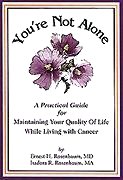|
Fifth Dimension Catalog Contact Us |
|

|

Support Groups - III. Psychological And Emotional Support |
Support groups provide patients with an opportunity to see the problems they are confronting through the eyes of others. This can give patients a new perspective on their situation, reduce the inappropriate guilt felt by some, and help patients to recognize that their problems are the result of the cancer, rather than some personal failing. Questions such as Why me? take on a new meaning in a group of people wondering the same thing.
Although support groups may not be right for everybody, they assist patients in developing more active coping strategies and to dispel feelings of isolation. Group discussions can lead to the discovery of new domains of potential control. Taking charge of treatment decisions, working to improve family relationships and setting priorities can be powerful antidotes to the helplessness engendered by illness. Group members can also develop and consolidate their own sense of personal competence in dealing with cancer by helping other group members. Helping others enhances one's own sense of self-esteem and purpose in life.
Such programs are available in oncology centers, private practices, and supportive care programs. These programs are also available through the American Cancer Society, and The Lymphoma and Leukemia Society. Recently, efforts have been made to establish Internet chat rooms for cancer patients. While maintaining quality control is a difficult problem, electronic support has already opened new worlds of information for patients, and it may also provide emotional support at little or no cost.
Robert Watts, a professional football player, cured of Hodgkin's lymphoma, comments on his reasons for joining a support group:
When I was diagnosed, I was a professional athlete. I was used to putting problems aside. I could not think about injuries when I was playing or I would get injured and instead I would picture myself doing what needed to be done, picture myself winning. That didn't work with this (having Hodgkin's disease), although I used it as my model for getting through treatment.
It was after treatment that problems began. I would find myself getting overwhelmingly anxious, feel tight in the chest. I remember working out in my gym at home and after fifteen seconds with skipping rope, my chest tightened up, my muscles were tight from the radiation and I didn't know how to deal with that. I was scared I was going to die. But I wasn't allowed to be scared...
But the greatest thing that turned me back towards my feelings are what I learned with the Survivors' Group. One night when I was feeling bad, a young Latin woman entered the group. She had recently completed her therapy for lymphoma. She cried every time she attempted to talk about her pain. Finally, she spoke about not being able to feel good about anything, about not feeling lovable. For the first time, I heard someone talking about experiencing what I had experienced and suddenly, I realized that I was not the problem, but instead that I had a problem.
Such moments of clarity, identification and connection that come with discussing deeper concerns are part of the emotional healing process that group therapies offer cancer patients.
|
You are welcome to share this © article with friends, but do not forget to include the author name and web address. Permission needed to use articles on commercial and non commercial websites. Thank you. |